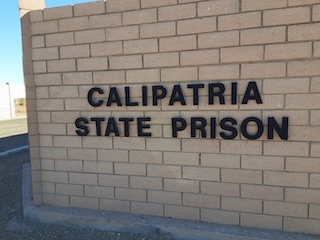For those serving an indeterminate sentence, i.e., 25 to life with the possibility of parole, the MEPD applies. It is calculated based on the minimum statutory term for the life offense (usually 15 or 25 years), minus any pre-sentence credits and minus any in-prison custody credits.
The minimum statutory term can be added together, i.e. if someone is sentenced to a 15 years to life on one count and a consecutive 25 years to life on a second count, the minimum statutory term for calculating one’s MEPD is 40 years.
In prison custody credits have been modified by Prop 57, effective May 1, 2017. After this date, anyone convicted of first-degree or second-degree murder for a murder committed on or after June 3, 1998 or after receives one day extra credit for each four days served (20% credit). Such credits are not retroactive, so the extra credit only starts accumulating after May 1, 2017.
 Calipatria State Prison
Calipatria State Prison
The same 20% credit is now available after May 1, 2017 for anyone serving time in prison for life sentence related to a gang crime, torture, kidnapping for ransom, robbery or rape during a carjacking, train-wrecking, aggravated assault by a person with a life sentence and bombing.
The 20% credit even applies to those serving life sentences under the Three Strikes Law and for sex offenses and those who have been deemed a “habitual sex offender” for crimes committed on or after September 20, 2006.
In addition, under Prop 57, those convicted of certain crimes that previously were afforded 15% credit for time served (one day for each six actually served), now are eligible for slightly more credit - 20% credit. The certain crimes included in this increased credit class include those convicted of a violent felony only, people committed to life terms or as a habitual sex offender for crimes committed prior to September 20, 2006 (Penal Code § 667.61, formerly 667.71), people with life term enhancements for discharging a firearm and causing great bodily injury (Penal Code § 12022.53(d)).
In addition, those convicted of murder for a crime that took place prior to June 3, 1998, received one day credit for each two days served (33% credit), as well as those deemed a “habitual sex offender” for a crime that took place prior to January 1, 1987.
In addition, after January 1, 2010, inmates could earn “Milestone Credits” for completing certain educational degrees, attending vocational courses and attending certain therapeutic programs like Alcoholics Anonymous and Narcotics Anonymous. However, very few people serving life sentences were able to take advantage of such programs because most were deemed ineligible for many of these programs, sadly. Effective August 1, 2017, however, these restrictions were removed.
It should be noted that there are limits to how much an inmate may reduce his sentence. If the inmate was especially motivated and took advantage of nearly every opportunity to earn in prison credits, he or she cannot reduce his sentence to less than seven years.
Lastly, it should be noted that if someone is sentenced to a life sentence, but then received a consecutive determinate term for conduct while in prison, the inmate still may have a parole hearing and be granted parole, but the person will not be released on parole until he or she first completes the determinate term imposed for conduct in prison.
For more information about custody credits and parole issues, please click on the following articles:
 Ventura County Jail
Ventura County Jail Calipatria State Prison
Calipatria State Prison